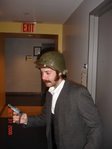No, it's not me, it's author
Will Lavender. In his piece up at
Salon, Mr. Lavender tells the story of his conversion from being a failed writer of literary fiction to a successfully published author of thrillers. Along the way, he had to disabuse himself of those pretensions which held him back from creating works that were enjoyable to both write and read. It is a valuable lesson for any aspiring writer who is not only trying to find their voice, but also what kind of story to share with the world. Lavender's journey is about finding one's true style and coming to terms with what one makes, not worrying about what critical opinion because the writing itself can grant great pleasure.
I do have an very distant and indirect relationship with Will Lavender, in the fall of 2007, I interned at
Folio Literary Management. At the time, they were representing his first novel, Obedience. In a strange set of coincidences, this essay of his was published at the same time that I saw a recent Jeopardy question that involved another Folio author, Garth Stein, and his novel The Art of Racing in the Rain. While I interned at the agency, I remember a lengthy telephone conversation between Lavender and his agent. Even after having published a thriller, he was still unsure about the direction he wanted to go with his writing and just which genre he wanted to write in. The agent suggested that switching genres was a risky move since he had created a brand for himself as a writer of thrillers.
It is clear that Lavender has accepted the fact that what he truly wants to write are thrillers. Before his conversion, he was trying to become the next great literary light, but was more concerned with looking the part than actually producing anything of literary merit. According to him, his own writing was stale as in was merely an imitation of other figures that he admired. He claims he was a wannabe John Ashbery at one point (it's not clear, but I suppose he wanted to be a poet before he wrote literary fiction) and then was a "Michael Chabon lite." He found nothing worthwhile in what he was writing and it was hard for him to
find something original to say.
This changed once he began reading thrillers, a genre of work that he had previously dismissed as light, fluffy, and disposable. Lavender began to enjoy the writing and started to change his own style to create the kind of writing he enjoyed reading the most, which turned out not to be literary after all. Now that he has completed and published two thrillers, he seems he has found his calling. He no longer writes literary fiction and does not mind it either, another sign that writing thrillers is what he ought to be doing. A literary writer would view such work as a distraction from more serious pursuits, just as Lavender realized his previous "highbrow" writing was a detour that lead him away from what he was better suited to produce.
Yet, despite coming to terms with what he was meant to write, Lavender does shows a certain uneasiness from working in with thrillers, and he feels a need to justify his switch by claiming genre fiction isn't really different from literary fiction at all. But the way he does it only has the effect of reinforcing the divide between literary and genre fiction. He defends the literary merits of thrillers on one hands while at the same time he attacks the literary establishment, which revels in those merits, for denigrating literature written for the sake of entertainment. If he was a genre writer completely satisfied with his choice, he would not bother making such defenses. All Lavender would need to say is that he came to see nothing wrong with writing books to entertain. Instead, he tries to make a case that genre thrillers can be art.
Lavender does not really spend much time creating a reasoned defense of this position. It is simply something that has to be true to him so he can feel justified in writing thrillers. He certainly finds them enjoyable and uses the pleasure they produce as a defense of their artistic merit (calling such experiences "transcendent"). But this is not enough and perhaps if allowed to write a longer piece, he would be able to elaborate. Similar defenses for the role of feeling in aesthetic judgment have been made. Indeed, the very term "aesthetics" is derived from the Greek word
aisthetikos, which in turn comes from the phrase "I feel/perceive/sense."
In his essay, Will Lavender should be showing the world how he is handling the apparent divide between literary an genre fiction in his own writing. This is how it seems he is truly coming to terms with being a genre writer while maintaining his literary background. Even if these interests no longer produce outright aspirations, they still permeate and enrich his work, which in turn helps him stand out from the typical run-of-the-mill thriller writers. For instance, Obedience, his first novel, is a murder mystery set within the confines of a class on logic and reasoning, which helps to bring a philosophical element into the work. Meanwhile, in his latest novel, Dominance, he plays with ideas of authorship itself and the line between fiction and reality.
He does raise many good points in the essay about how the basics of storytelling, plot development, and character are often overlooked by literary writers in favor of experimentation that may end up just alienating the reader. In addition, he discusses how the line between genre and literary fiction is more blurred than we think, with both sides learning from the other. The modernist experiments in prose writing pushed out florid Victorian expression and created the prevailing style in genre fiction today, while writers such as Paul Auster mix elements of noir with literary concerns and ideas. Even a crime novel like Mario Puzo's The Godfather has plenty in common with a sprawling 19th century work than one might think, with dozens of minor characters having their own subplots. Beginning
with a quote by Balzac also helps to add to its literary heft.
From the tone of the piece, I wonder if Lavender really has accepted himself as a genre writer, rather than accepting that what he wants to write is genre fiction. I think this is an important distinction to make, if one believes there are separate categories for literary and genre writers. In this case, to come to terms with being a genre writer means not having to worry about whether or not one is making art and to focus on good stories instead. If the result is hailed as art, it is a happy accident, but not the primary objective. Genre writers understand what they do and what effect their genre produces. They have no illusions. Likewise, literary writers know that what they create is often going to be difficult for others to read and do not expect to land a major motion picture deal. Again, if it happens for them, it is a pleasant surprise.
I think part of the problem is that the idea of a work being either "literary" or "genre" is misplaced, as if these are two mutually incompatible spheres. I think it is more productive to see literary fiction existing across all genres, especially since most genres have their root in the work of literary icons. It is not a matter of crossing the literary with a particular genre, which is how Lavender seems to view his work, but bringing it out instead. Poe helped develop horror and mystery while romance and so-called chick-lit would be radically different without the legacy of Austen. It would help end the prejudice against seeing a whole stream of writing as incapable of doing anything literary because it is grounded in a genre. I know it is especially problematic when giving writers of science-fiction their due, but is true for any given genre. Hopefully, as book selling moves increasingly online the current division, which was as much a product of retailing as anything else, will be erased in favor of a more expansive view of what can be literary or not.







